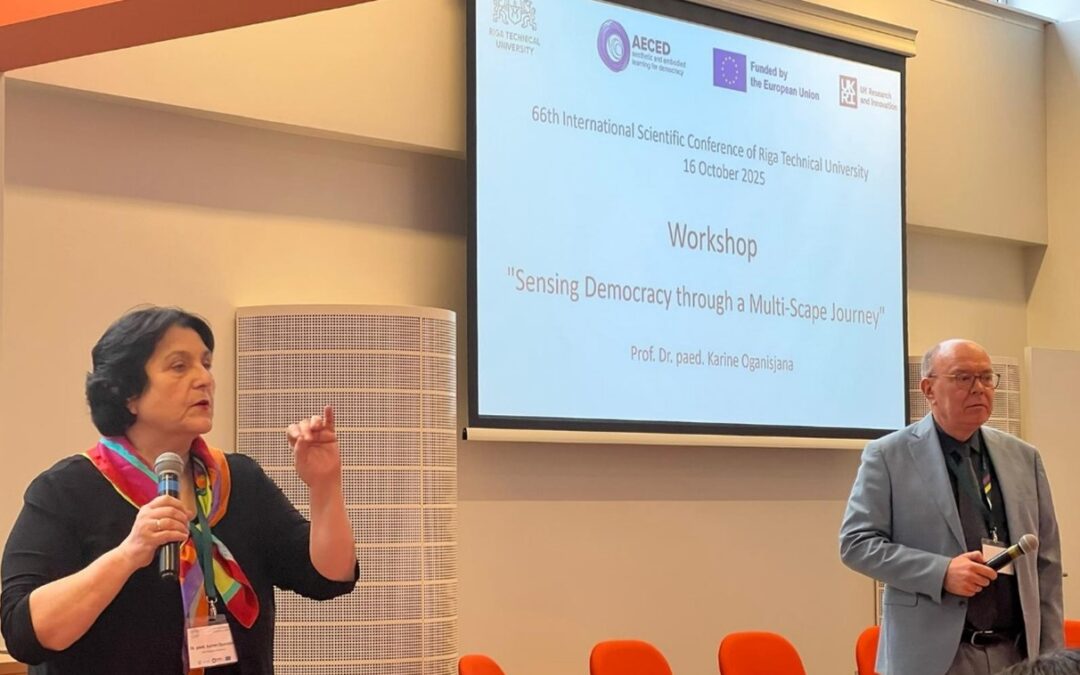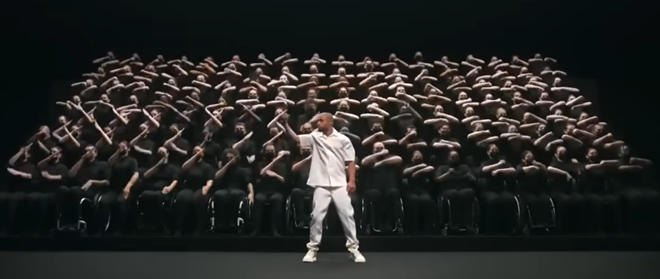Surprises, Discoveries, Cognitive Dominance
The workshop “Sensing Democracy through a Multi-Scape Journey” took place on 16 October 2025 during the 66th International Scientific Conference of Riga Technical University. As a co-organiser of the conference, the Latvian partner of the Horizon Europe project AECED aimed to offer participants not only a space to discuss democratic values, but also to feel them through emotions and the senses.
During the workshop, participants explored a series of activities designed to reveal how our senses – hearing, sight, touch, smell, and even taste, shape learning and influence how we make meaning. The session began by introducing six democratic values – equality, freedom, dialogue, empathy, solidarity, and responsibility, each briefly defined to ensure a shared understanding.
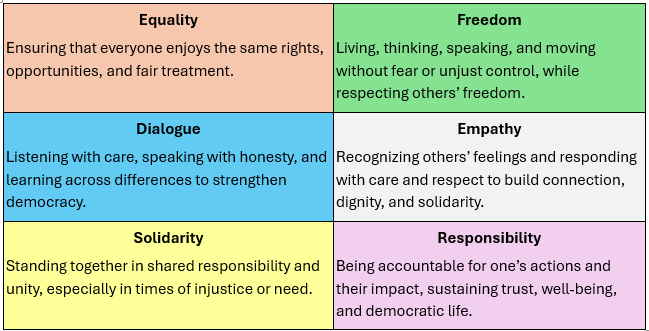
The first activity, once the conceptual ground was set, invited participants to sense democracy through an experiential exercise that centered on a music piece.
“Just close your eyes, relax and listen to this piece of music. When it ends, you will share which democratic value it evokes for you and why”.
With these words, the participants closed their eyes and listened to Il Silenzio performed by Folkert-Hans, allowing the sound of the trumpet and orchestra to fill the room as they relaxed and trusted the moment.
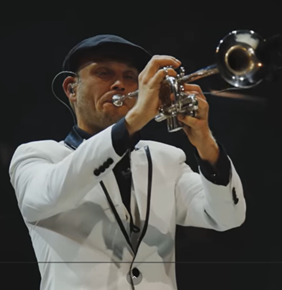
Snapshot: Folkert-Hans, YouTube
When the last note of Il Silenzio faded into silence, participants slowly opened their eyes. Their impressions were gathered through a Slido poll, which showed that half associated the piece with Freedom.
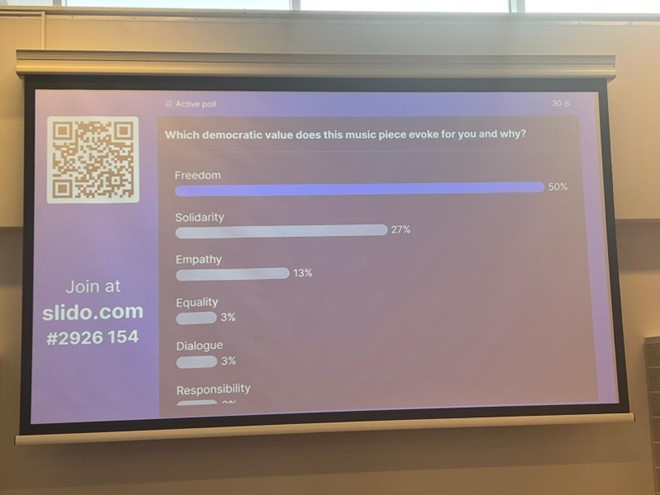
Photo: Results of the Slido poll showing which democratic values the participants associated with Il Silenzio
The first comment came from a participant from the USA, who said the trumpet reminded him of Taps – the piece traditionally performed at U.S. military funerals and ceremonies to honour those who gave their lives for freedom.
A participant from Latvia, who also voted for Freedom, shared that as a former dancer, her body instinctively felt the broad, free, flowing movements she would once have performed to that music.
A participant from Bulgaria associated the piece with Solidarity, as while listening to the music, he was simultaneously thinking about how everyone in the room was sitting together, eyes closed, sharing the same experience.
Another participant from Latvia said he felt Empathy in the music – a deep concern, sadness, and care for someone.
A participant from Poland mentioned Dialogue, explaining that the trumpet seemed to be “speaking” directly to him.
Even this first activity revealed how differently participants perceived the same experience. The colleague from the USA grounded his reflection in personal and cultural memory, while the Bulgarian participant responded cognitively, thinking about the shared situation of sitting together with eyes closed and listening to the same music. The others found emotional and sensory links between the music and the democratic values.
The second activity invited participants to watch a limb-centric performance choreographed by Sadeck Waff, a French dancer, choreographer and artistic director of the collective Géométrie Variable. This striking geometrically synchronized piece, performed by a group of 126 artists seated in wheelchairs, was part of the farewell ceremony for the 2020 Tokyo Paralympic Games as part of the symbolic handover to Paris 2024.
This time, instead of voting, participants shared their reflections freely. Several noted Responsibility, as in any synchronous performance, each participant must remain highly focused and responsible, since even a small mistake can affect the whole. Others mentioned Dialogue, describing the silent conversation between the choreographer and the performers; their mutual awareness guided each movement. Some saw Solidarity as the performers moved as one, sharing responsibility and expressing unity, both within the group and in connection with the Paralympic athletes. A few highlighted Equality, recognizing that all performers had an equal chance to participate and express themselves.
The third activity invited participants to “listen to” their own body signals and uncover how embodied experiences connect to democratic values. They were asked to stand up, close their eyes, inhale deeply while lifting their shoulders, then exhale forcefully as they let their arms drop.
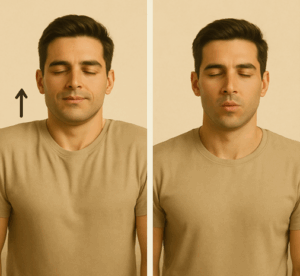
Image generated by ChatGPT of shoulder raise and drop with exhalation activity
Closing the eyes helped participants focus inward – tuning into the sensations within their bodies. After several repetitions, they sat down and voted via Slido for the democratic value they associated with the experience.
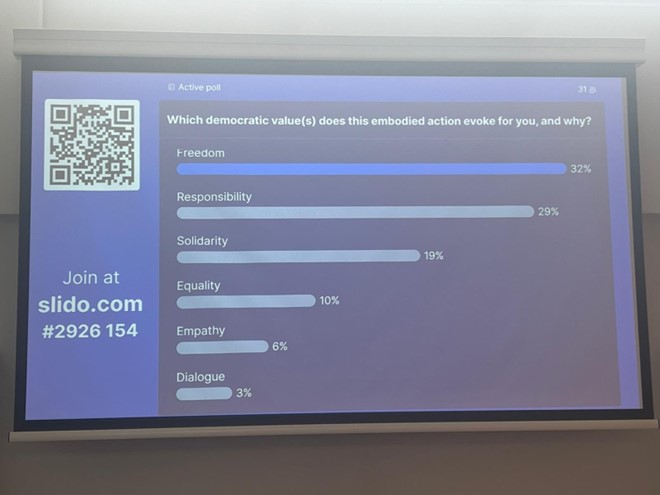
Photo: Slido poll results showing which democratic values participants associated with the embodied sensation of deeply inhaling, lifting their shoulders, and exhaling forcefully while dropping their arms
32% chose Freedom, describing a feeling of relief and release at the bodily level. Nearly a third chose Responsibility, linking the motion of “letting go” to releasing emotional weight or burdens they felt accountable for. Not all reflections were embodied; one cognitively oriented participant once again mentioned Solidarity, noting that “we were all doing the same thing together”.
The fourth activity focused on the sense of touch – participants closed their eyes and slowly stroked the surface of their conference badge, paying close attention to the sensations in their palms and fingertips.
Their comments on the Slido poll showed that about one third were not based on tactile sensations, but rather on the awareness that the object they were touching was a conference badge – something that automatically evoked Responsibility, as many participants associated it with their forthcoming presentations in the conference sessions after the workshop break.
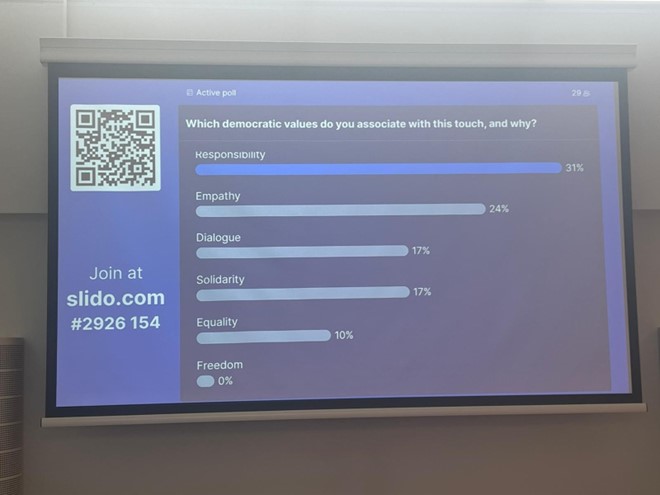
Photo: Slido poll results showing which democratic values participants associated with their tactile experience of touching their conference badge
The democratic values highlighted through the sense of touch were Empathy, as the smooth plastic surface of the conference badge created a feeling of care and connection, and Equality, as the even, uniform texture against the palm and fingers evoked an association with equal opportunities and rights for all.
The fifth activity was based on a very short YouTube clip taken from the blog “Healing Animal Energy” in which a koala gives a hug to a kitten lost in the forest.

Snapshot: Koala gives a hug to a Kitten, YouTube
The video was so emotional that several people began speaking at once. A few male participants immediately said “Responsibility,” while several female participants responded with “Empathy.”
We concluded that the male respondents might have reflected spontaneously an evolutionary tendency linked to traditional masculine roles – holding responsibility for the family, whereas the female respondents, whose evolutionary role has been associated with caring for children and offering comfort, tended to connect the experience with empathy.
The sixth final activity was meant more to provoke thought than to be taken literally. Participants were invited to close their eyes and recall the taste of the food traditionally eaten in their country on New Year’s Eve. Some joked that it was hard to remember the taste without eating it, while others suspected it was a prelude to lunch. One participant, however, responded “Solidarity,” noting that across nations, people share the same festive taste and feeling.
Conclusion
Surprises
What surprised us most was how quickly sensory moments opened different doors to the same values. Il Silenzio evoked Freedom for many, but also Empathy, Dialogue, and Solidarity – often within the same room, the same minute. The limb-centric choreography by Sadeck Waff revealed Responsibility not as an abstract rule, but as a living synchrony – each small gesture affecting the whole. Even the tactile smoothness of a simple badge became a prompt for Equality and Empathy. The surprise, then, was not just in what people named, but in how swiftly sound, movement, and touch made values felt.
Discoveries
Across activities – listening, watching, breathing, touch, and sensory imagination, participants found that democracy is not only argued or legislated; it is sensed, shared, and embodied. We discovered three pathways of connection working together:
- Emotional,
- Embodied,
- Cognitive
When these three align, values like Freedom, Empathy, Solidarity, Equality, Dialogue, and Responsibility become more than words – they become lived orientations.
Cognitive Dominance
Alongside these surprises and discoveries, we also noticed moments of cognitive dominance –the habit of letting analysis and labels arrive so quickly that they overshadow aesthetic attention and embodied experience. Instead of staying with the felt qualities of the moment, some responses defaulted to prior knowledge, roles, or symbols (e.g., “it’s a conference badge → Responsibility”), or moved straight to explanation before sensing.
Cognitive dominance isn’t “wrong,” but it can crowd out what sound, movement, breath, and touch are already telling us. When naming precedes noticing, emotion and embodiment are muted; the experience becomes categorized rather than felt.
A simple corrective emerged in the workshop: pause, sense, then name. Giving ourselves a beat to attend through embodied and aesthetic experience allows cognition to join rather than override. In that order, our understanding of democratic values becomes not only clearer but more fully lived.
Blog by Karine Oganisjana of AECED Latvia and Riga Technical University: Karine.Oganisjana@rtu.lv
To be kept informed of future AECED events or to register your interest in the project please complete this short form: Registration of interest
#Education4Democracy

